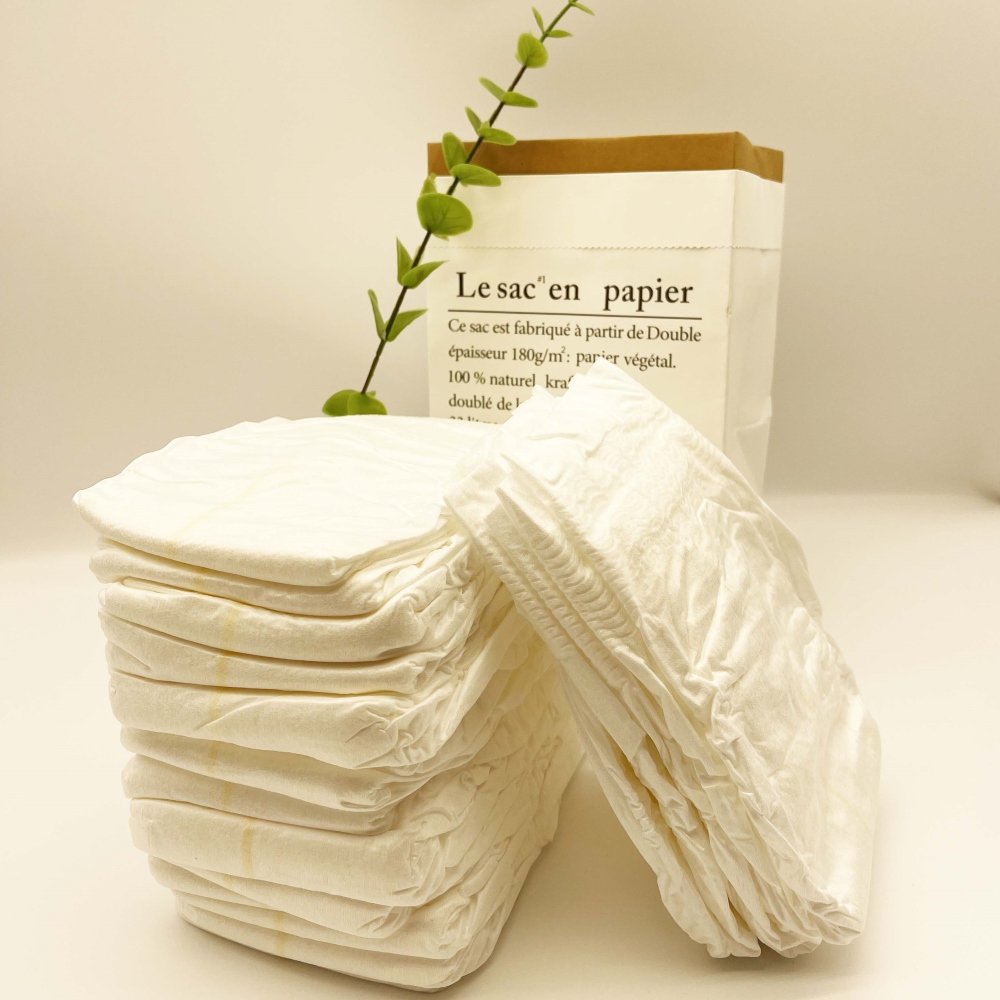Pannolini in bambù si stanno affermando come alternativa sostenibile ai tradizionali pannolini usa e getta. Uniscono l'ecocompatibilità alla funzionalità, offrendo ai genitori una scelta più ecologica senza compromettere le prestazioni. Questi pannolini sono realizzati in bambù, una risorsa rinnovabile e in rapida crescita, che li rende incredibilmente morbidi e altamente assorbenti. Sono la scelta perfetta per le famiglie che danno priorità alla sostenibilità e all'ecocompatibilità.
Il passaggio a prodotti ecologici ha portato a un aumento della varietà di opzioni di pannolini ecologici a disposizione dei genitori. I pannolini di bambù si distinguono in questo mercato in crescita per i loro benefici naturali e i processi di produzione sostenibili, segnando un significativo passo avanti nel movimento ecologico.
La materia prima: Il bambù
Perché il bambù è ecologico e sostenibile
Il bambù è una pietra miliare del mercato dei pannolini ecologici grazie ai suoi modelli di crescita sostenibili. Richiede meno acqua e nessun pesticida per crescere, il che lo rende un'opzione più ecologica rispetto al cotone tradizionale o ai materiali sintetici.
Raccolta e lavorazione del bambù
Il processo di trasformazione del bambù in pannolini inizia con la raccolta della pianta di bambù, che viene effettuata in modo da consentirle di continuare a crescere, riducendo al minimo l'impatto ambientale. Il bambù viene poi trasformato in una polpa, che alla fine si trasforma nel tessuto morbido e assorbente utilizzato nei pannolini.
Processo di produzione
Trasformare il bambù in tessuto
Il processo di produzione dei pannolini di bambù prevede la trasformazione della polpa di bambù in fibra attraverso l'idrolisi-alcalizzazione e lo sbiancamento multifase. Questo tessuto viene poi intrecciato in fogli che costituiscono l'anima del pannolino, noto per la sua morbidezza e l'elevata assorbenza.
Creare i pannolini: Dal tessuto alla finitura
La fase finale del processo di produzione prevede l'assemblaggio dei vari componenti del pannolino. Questo include l'aggiunta di strati per l'assorbenza, l'applicazione di elastici per una vestibilità aderente e l'applicazione di rivestimenti impermeabili per prevenire le perdite.
Vantaggi del pannolino di bambù
Impatto ambientale e sostenibilità
I pannolini di bambù hanno un impatto ambientale minore rispetto ai pannolini tradizionali. Sono biodegradabili e compostabili, riducendo i rifiuti in discarica. La crescita sostenibile del bambù significa anche meno deforestazione e inquinamento.
Salute e comfort per i neonati
Il tessuto di bambù è la scelta perfetta per chi ha la pelle sensibile, poiché possiede proprietà anallergiche e antibatteriche naturali. Ha anche eccellenti proprietà di traspirazione, che mantengono i bambini asciutti e comodi.
Analisi comparativa
Pannolino in bambù contro pannolino tradizionale
Il confronto tra il bambù e i pannolini tradizionali ne mette in evidenza i vantaggi, tra cui una maggiore sostenibilità ambientale, la facilità d'uso per la pelle e l'assorbenza.
Analisi costi-benefici
Se inizialmente i pannolini in bambù possono costare di più, i loro vantaggi a lungo termine, come il ridotto impatto ambientale e i vantaggi per la salute, offrono un risparmio e un valore significativi.
Come vengono prodotti i pannolini di bambù?
Processo di produzione passo dopo passo
La produzione di pannolini in bambù prevede diversi passaggi chiave, dalla raccolta sostenibile del bambù agli accurati processi di produzione che garantiscono che il prodotto finale sia ecologico e sicuro per i bambini.
Controllo di qualità e standard industriali
Durante l'intero processo di produzione, vengono attuate rigorose misure di controllo della qualità per soddisfare gli standard del settore, assicurando che i pannolini di bambù siano della massima qualità e sicuri per l'uso.
Sfide e soluzioni
Superare gli ostacoli alla produzione
I produttori devono affrontare sfide quali il mantenimento della sostenibilità lungo tutta la catena di approvvigionamento e la soddisfazione della forte domanda dei consumatori, ma le soluzioni innovative e i progressi tecnologici stanno aiutando a superare questi ostacoli.
Innovazione nella tecnologia dei pannolini di bambù
L'industria dei pannolini di bambù continua a evolversi, con una ricerca e uno sviluppo continui che portano a metodi di produzione più efficienti e sostenibili.
Approfondimenti per i consumatori
Tendenze di mercato e domanda
La domanda di prodotti ecologici da parte dei consumatori è in aumento e i pannolini in bambù stanno diventando sempre più popolari, in quanto i genitori sono sempre più consapevoli del loro impatto ambientale.
Recensioni e testimonianze dei clienti
I feedback positivi degli utenti che lodano il comfort, l'assorbenza e la natura ecologica dei pannolini in bambù contribuiscono alla loro crescente popolarità.
Cura e manutenzione
Suggerimenti per i pannolini di bambù riutilizzabili
Una cura e una manutenzione adeguate, tra cui il lavaggio regolare e l'evitamento di prodotti chimici aggressivi, possono prolungare la durata dei pannolini riutilizzabili in bambù.
Smaltimento dei pannolini di bambù monouso
Anche i pannolini di bambù monouso devono essere smaltiti in modo responsabile per garantire che si decompongano correttamente e ridurre al minimo l'impatto ambientale.
Pannolini di bambù e responsabilità ambientale
Il futuro dei pannolini sembra verde, con i pannolini di bambù in testa. La loro produzione sostenibile, i benefici per l'ambiente e la soddisfazione degli utenti fanno pensare a una tendenza continua di genitorialità eco-consapevole.
Questa dettagliata esplorazione di come vengono prodotti i pannolini di bambù ne illustra i vantaggi per l'ambiente e la salute, offrendo una soluzione sostenibile per i genitori attenti all'ambiente. I pannolini di bambù non solo favoriscono la salute e il comfort dei bambini, ma contribuiscono anche in modo significativo alla riduzione dei rifiuti ambientali, rendendoli una scelta privilegiata per chi vuole ridurre al minimo la propria impronta ecologica.
Conclusione: Il futuro del pannolino
I pannolini di bambù rappresentano un significativo progresso nei prodotti sostenibili per l'infanzia. I genitori attenti all'ambiente possono ora scegliere una soluzione pratica e confortevole per i loro bambini. Non c'è dubbio che la domanda di prodotti ecologici sia in costante aumento. Il pannolino di bambù è emerso come una soluzione promettente per le preoccupazioni ambientali associate ai metodi tradizionali di pannolini. Grazie alle loro proprietà sostenibili e biodegradabili, offrono un approccio più costruttivo al pannolino, a beneficio sia dei genitori che del pianeta.
In conclusione, i pannolini di bambù sono più di una semplice alternativa ecologica: sono una testimonianza delle possibilità di vita sostenibile e dell'impatto positivo che scelte ponderate possono avere sul nostro pianeta. In prospettiva, si prevede che la crescente adozione e il progresso dei pannolini di bambù avranno un impatto positivo sulla promozione di un futuro più ecologico e sostenibile.
Domande frequenti
Quanto tempo impiegano i pannolini in bambù a biodegradarsi?
I pannolini di bambù sono progettati per essere più ecologici e in genere si biodegradano entro 3-6 mesi nelle giuste condizioni, a differenza dei pannolini tradizionali che possono impiegare centinaia di anni per degradarsi.
I pannolini in bambù possono essere utilizzati per la protezione notturna?
Sì, grazie alla loro elevata assorbenza e traspirabilità, i pannolini in bambù sono una scelta eccellente per l'uso notturno, garantendo che i bambini rimangano asciutti e comodi per tutta la notte.
I pannolini in bambù sono convenienti nel lungo periodo?
Inizialmente, i pannolini in bambù possono sembrare più costosi dei tradizionali pannolini usa e getta. Tuttavia, considerando la loro natura riutilizzabile e la loro durata, possono risultare più convenienti nel tempo, riducendo la necessità di acquisti frequenti.
I pannolini in bambù contengono sostanze chimiche nocive?
La maggior parte dei pannolini in bambù è realizzata con processi sicuri e non tossici, privi di sostanze chimiche nocive come cloro, lattice e ftalati, che li rendono più sicuri per i bambini e per l'ambiente.
Come posso assicurarmi che i pannolini di bambù che acquisto siano di provenienza sostenibile?
Cercate certificazioni come OEKO-TEX, FSC o simili, che indicano che il bambù utilizzato nel pannolino è stato ottenuto in modo sostenibile ed etico.
Cosa rende il bambù un materiale sostenibile per i pannolini?
Il bambù è una risorsa altamente rinnovabile che cresce rapidamente, richiede poca acqua e non ha bisogno di pesticidi o fertilizzanti per crescere, il che lo rende una scelta sostenibile per la produzione di pannolini.

